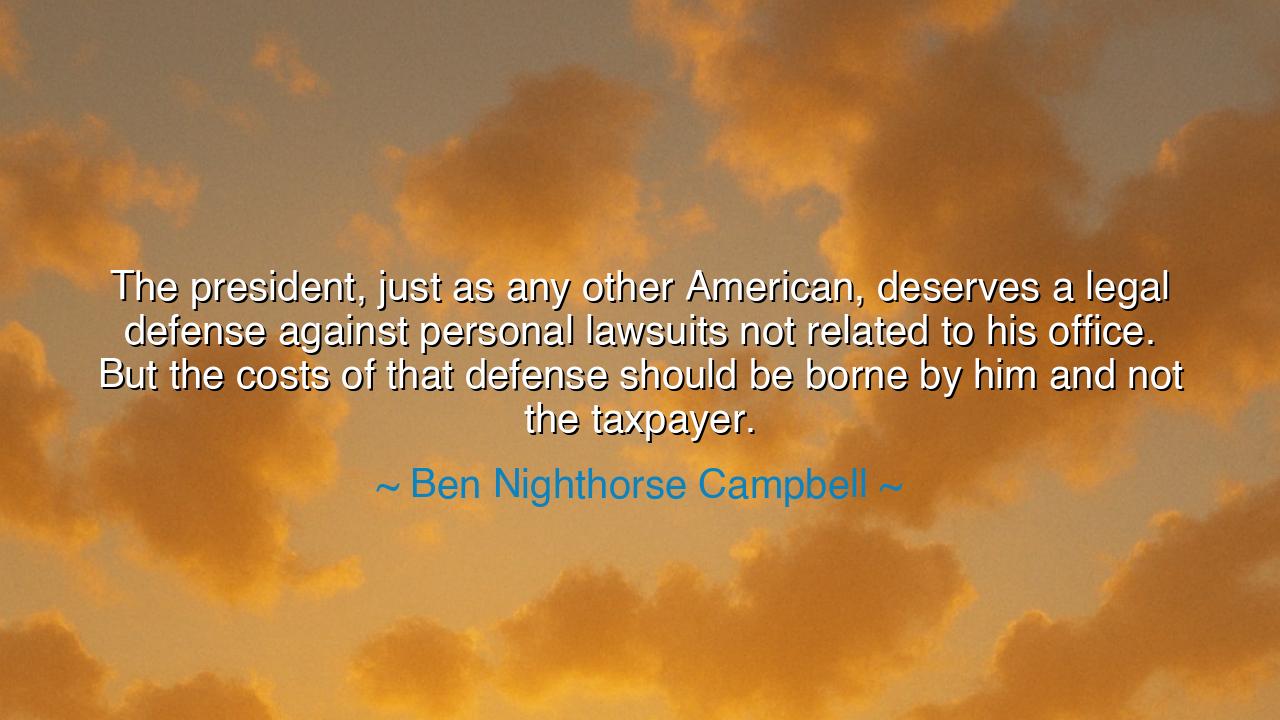
The president, just as any other American, deserves a legal
The president, just as any other American, deserves a legal defense against personal lawsuits not related to his office. But the costs of that defense should be borne by him and not the taxpayer.






When Ben Nighthorse Campbell declared, “The president, just as any other American, deserves a legal defense against personal lawsuits not related to his office. But the costs of that defense should be borne by him and not the taxpayer,” he spoke not merely of finance or policy, but of justice, equality, and the moral responsibility of leadership. His words rise from a deep well of wisdom — the belief that no man, however exalted his station, stands above the principles that bind the republic together. In that single statement, Campbell evokes the ancient truth that authority must never eclipse accountability, and that public trust must never be spent to settle private debts.
The origin of this quote lies in a moment of political tension and moral reckoning in the United States, when questions swirled around the personal conduct of those who held the nation’s highest office. Campbell, himself a man of integrity and a warrior by spirit — a Native American who had served his country both in uniform and in public office — understood that power is sacred only when it serves, not when it consumes. His statement was born from a desire to protect the purity of civic responsibility, to ensure that the office of the president remained a trust for the people, not a shield for personal indulgence.
In his words echoes the spirit of the ancients, who taught that a ruler must be both servant and guardian of the law. In the time of Solon of Athens, it was written that even kings were subject to the same statutes as the poorest citizen. And in the days of Cincinnatus, the Roman farmer who laid down his sword to return to the plow, leadership was not privilege but burden. Campbell’s declaration stands in this same lineage — an insistence that the president is first a citizen, bound by the same moral and legal fabric as all others. For if the leader is raised above the law, then the law itself becomes a tool of corruption, and the people its victims.
To say that the president “deserves a legal defense” is to affirm the universality of justice — that every human being, no matter how great or small, is entitled to defend his name. But to say that “the costs should be borne by him and not the taxpayer” is to affirm something equally vital: that the burden of wrongdoing must never be shifted onto the innocent. A nation’s treasury is the collective labor of its citizens — the sweat of its workers, the faith of its families, the dreams of its youth. To use that sacred trust for personal salvation is to desecrate the very foundation of democracy.
History offers us somber warnings. The downfall of Louis XVI was hastened not merely by political failure, but by the perception that the monarch’s personal extravagance was fed by the people’s suffering. When rulers blur the boundary between the public good and private gain, they summon the storm that destroys thrones. Campbell’s wisdom, then, is not only political but prophetic: a reminder that the strength of a republic lies not in the splendor of its officeholders, but in the steadfastness of its fairness.
Yet, his quote also teaches mercy — for he acknowledges the humanity of the president, that he too is fallible and deserving of defense. Campbell’s words call for balance: compassion without indulgence, justice without cruelty. He reminds us that to hold power is not to escape the law, but to live more deeply within it. The leader who accepts this truth will govern wisely; the one who rejects it will fall by his own pride.
So let this teaching endure for future generations: leadership is not exemption — it is accountability magnified. Those who bear the mantle of power must carry their own burdens, and pay their own debts, both moral and legal. The people’s trust is not a purse to be opened for personal redemption, but a covenant to be guarded with humility and honor. For when rulers live by the same justice they proclaim, the republic stands firm; but when they do not, even the mightiest institutions crumble into dust. And thus, as Ben Nighthorse Campbell reminds us, the measure of greatness is not in how high one rises, but in how faithfully one abides by the laws that make us all equal.






AAdministratorAdministrator
Welcome, honored guests. Please leave a comment, we will respond soon